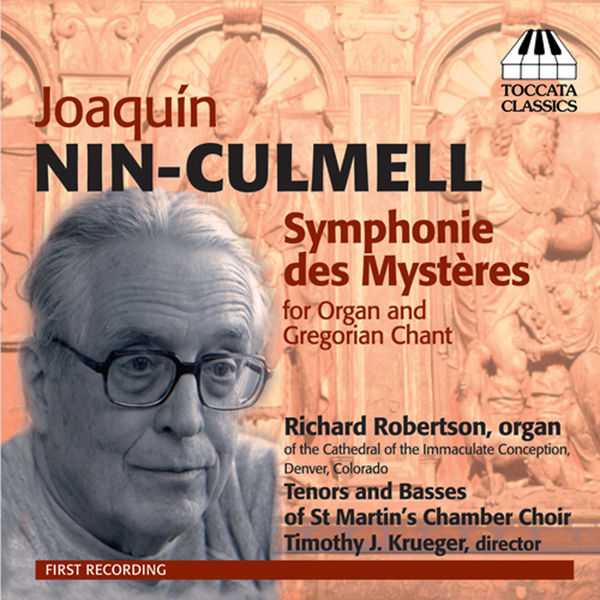
Composer: Joaquin Nin-Culmell
Performer: Richard Robertson, St. Martin’s Chamber Choir
Conductor: Timothy J. Krueger
Format: FLAC (tracks)
Label: Toccata
Catalogue: TOCC0011
Release: 2011
Size: 197 MB
Recovery: +3%
Scan: cover
Symphony of the Mysteries
I. Joyeux
01. Ave Maria (chant)
02. Serenade
03. Benedicta tu inter mulieres (chant)
04. Dialogue
05. Puer natus est nobis (chant)
06. Il est nel
07. Lumen ad Revelationem gentium (chant)
08. Offrande
09. Fili, quid fecisti nobis sic? (chant)
10. Retrouvailles
II. Douloureux
11. Pater, si non potest hic calix transire (chant)
12. Les Gouttes de sang
13. Ego te pavi manna per desertum (chant)
14. Les Coups
15. Ego dedi tibi sceptrum regale (chant)
16. La Couronne d’epines
17. Christus factus est pro nobis (chant)
18. Les Blessures
19. Sanctus Immortalis, miserere nobis (chant)
20. Les Rivieres de sang
III. Glorieux
21. Et valde mane una sabbatorum (chant)
22. Le lever du soleil
23. Ascendit Deus in jubilatione (chant)
24. Les Nuages
25. Alleluia, Assumpta est Maria caelum (chant)
26. Le Vent
27. Factus est repente de coelo sonus (chant)
28. La Ceinture mystique (Lourdes)
29. Ave, Regina caelorum (chant)
30. La couronne mystique et retour de la Serenade
Joaquin Nin-Culmell (1908–2004) was a student of Dukas and Falla and his early music reflects his Spanish background.
Born in Cuba to a dysfunctional but musical family (his father was a composer-pianist and his mother a singer, and his sister was the writer Anaïs Nin) he grew up in Barcelona where he first studied music.
His Symphonie des Mystères – one of his last works, composed in 1992–94, for alternating Gregorian chant and organ – is a suite based on the fifteen Mysteries of the life of Christ.
The work is divided into three main spans – ‘Joyeux’, ‘Douloureux’ and ‘Glorieux’ – each of which contains five Gregorian chants and a quasi-improvised organ reflection on the chant and its meaning.
Beginning in a contemplative spirit, the music – written in a style slightly similar to that of Mesiaen – becomes fiercer and more passionate as the work progresses.
The Symphonie des Mystères is a work which will appeal not only to organ buffs and those interested in the music of the twentieth century, but the deep faith it embodies ought to find a sympathetic audience among Catholic listeners, too.